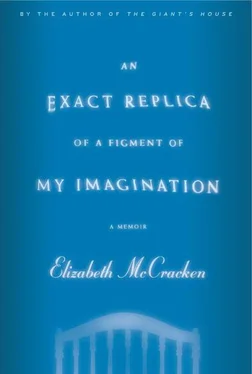My child had died. The next day I would see him for the first time. But until then, what was I? A figure common in old paintings and poetry. The bereaved carrying the remains of my beloved dead. Not out of bravery. Not out of devotion. Not out of hope that God had gotten it wrong and would change His mind.
Because I had to.
We went back to the hospital, where we could smoke on the park benches outside the building like the mental patients we were. Hard cases, not to be trusted with privileges.
A year later, when we spoke of the anniversary of Pudding’s death, it was hard to know how to measure it. It felt like something biblical, though not out of the Testament I know anything about. He died, and then two days later he was born. Where was he in the meantime?
Since he died, I’ve never had a dream of him alive.
In the morning the ward midwife came to get us. We’d been awake for hours. I went down the hall first, to the showers, five tiny cabins on a narrow corridor. I barely fit. It was the first shower I’d taken since Pudding had died. I soaped myself without looking, dried myself with the sad French institutional towel, and put on the hospital gown.
What is there to say of the labor, the delivery? The midwives, one in her thirties and one in her early twenties, were sweet and attentive. The oddball anesthesiologist came back and gave a long lecture in English about epidurals, how they blocked both pain and the ability to sense temperature. He tested his work by running an ice cube down my leg. This epidural, he said, taking a seat next to my bed and crossing his legs in a jaunty manner, was self-administered. I would have a button to press for more relief. It still might run out, and I should say if it did. It did run out. They fed more medication into the machine, which fed into me. In that dry patch of no pain relief, I twisted Edward’s hand and said in a panicked voice, “I don’t want to do this, I don’t want to do this!” but I gather plenty of women in labor say the same thing.
Edward and I had discussed it: I told him to leave the room for the actual delivery. It was a horrible thing to go through, and I wanted to spare him. That is, the watching seemed horrible to me. The delivery did not seem nearly so bad. Really, it felt like the last thing I could do for Pudding.
Edward had shouldered a great deal in the past few days, he had pushed his enormous pain aside to tend to me, and this seemed like one piece of pain I could keep him from. Pudding’s death was something the two of us went through together. The delivery wasn’t, couldn’t be. In the end, it didn’t even seem like something I went through. Those midwives in their French politeness called me Mrs. Harvey, Madame Harvey . They addressed me in the formal manner: Poussez, Madame Harvey, très bien, Madame Harvey, and that’s who it was happening to, someone else, someone differently named, worthy of respect. The epidural did its job and I felt nothing and in the end it wasn’t something Edward and I went through together and it wasn’t something that I went through by myself. It was something that Pudding had to go through. We three women in the room did our best to help him but in the end he was alone.
They took him immediately from the room to clean him up and got Edward. He looked so sad, my poor husband. I don’t know how long he’d been out of the room. Twenty minutes, I think. Everyone had told us that it was very important to see our child no matter what. Now we waited dutifully for Pudding. The nurses brought him in and set him on the delivery table, in front of where I sat cross-legged in my gown.
“He looks like an old man,” Edward whispered, stroking his arm. A medium-sized baby, just over seven pounds. We touched him very tenderly. He wore a diaper and a knit yellow hat. The hair beneath the hat was dark, like mine. His cheeks were plump and his legs were skinny, and yellow, and undeniably dead. From the waist up he was rosy, and his lips were very, very red, very defined in his face. They were his father’s lips.
We stroked him and told him we were sorry. Later Edward said, “I didn’t know what it was I was feeling. Then I realized it was seeing someone and knowing immediately that you love him.”
“We’re ready,” we told the midwives, and they took him away. My great regret is that I didn’t pick him up.
For a long time when I looked at Edward, the first place my eyes stopped at was his mouth.
Faces famously fade from memory, and yet I swear I remember exactly what Pudding looked like. I’m glad I don’t have a picture to contradict me. The lips and the rosiness were the result of blood and gravity. His lips were lovely because he was dead, and because he’d been upside down inside of me, and because he was dead.
All day long I wondered where Sylvie was. She had told me she would be there for the delivery. She finally showed up in the hospital room at five. The first thing she said was, Elizabeth, you were careful about what you ate, weren’t you?
I was in bed, holding very still, but even so I froze. I said in my bad French, I thought I was, but maybe. .
That’s not it, said Edward.
She got a frightened look on her face and began to pat my frozen arms. Your baby, she said in French, your poor baby. She’s trying to make me cry, I thought, and I still think that’s what she was doing: she was worried that we blamed her, and so she tried to push the blame off onto me, and then she realized it was perhaps not the right time for such a transfer and tried to distract us from what she’d just said. She patted my arms harder. It’s very sad, she said.
I wanted her to leave, but I could not ask, because of course this was all my fault. I still believed that, a conviction so awful and unshakable that I didn’t say it aloud. If I’d said it to Edward, he would have tried to dissuade me, and my belief was an inoperable cancer, dangerous where it was but more dangerous to move. I could not put my finger on what I had done wrong. Eaten something. Failed to eat something. Rested too much or exercised too much. Got pregnant too old. Was smug. He died inside of me: Of course it was my fault. It happened on my watch.
I think, said Edward in a firm voice, Elizabeth would like it if you’d leave now. At the time it seemed like an astonishing piece of mind reading. Sylvie nodded and got up. Call me before you leave Bordeaux, she said, but we never did.
The midwife on the ward the next day was the kindest of all of them, in her forties, with dark hair gathered back and a careworn face. She gave me a sponge bath, and then she said, How are you?
Not good, I said.
But how, she asked me seriously, is your morale?
I smiled. I said, still smiling, not good. Not terrible but not good.
Of all the people who attended to me over those days, she was the only one who seemed to know that a sad thing had happened.
As she left I said, You’re very kind.
She shrugged. Then she said, “C’est normal,” it’s normal, which means, of course, Who wouldn’t be kind to you? But she said it in a voice that suggested that she knew: it wasn’t normal after all.
I have mostly forgiven myself, and on good days I can say, What else could I have done?
I find myself thankful for large and small things, in the way of people who’ve lost two limbs and are glad not to have lost four. Labor and delivery took four hours altogether; that was a mercy. They gave me medication that prevented my milk from coming in, which worked: that, too. We were thankful for the midwives who’d delivered Pudding. The young one said, À bientôt, when she left, See you soon . We were thankful that we could leave France, thankful that we could live near the sea for a few months, extraordinarily thankful that I got pregnant again so soon, and that the pregnancy held. I am not sure what sort of person I would be if that hadn’t happened.
Читать дальше












